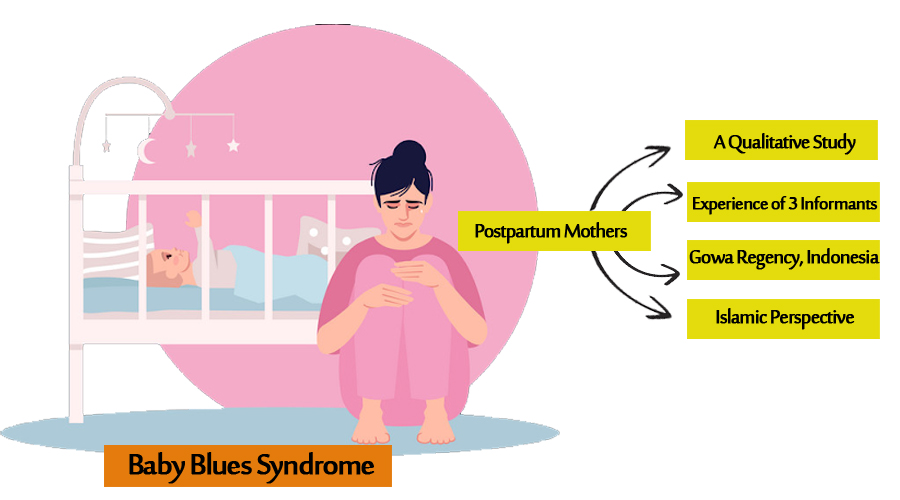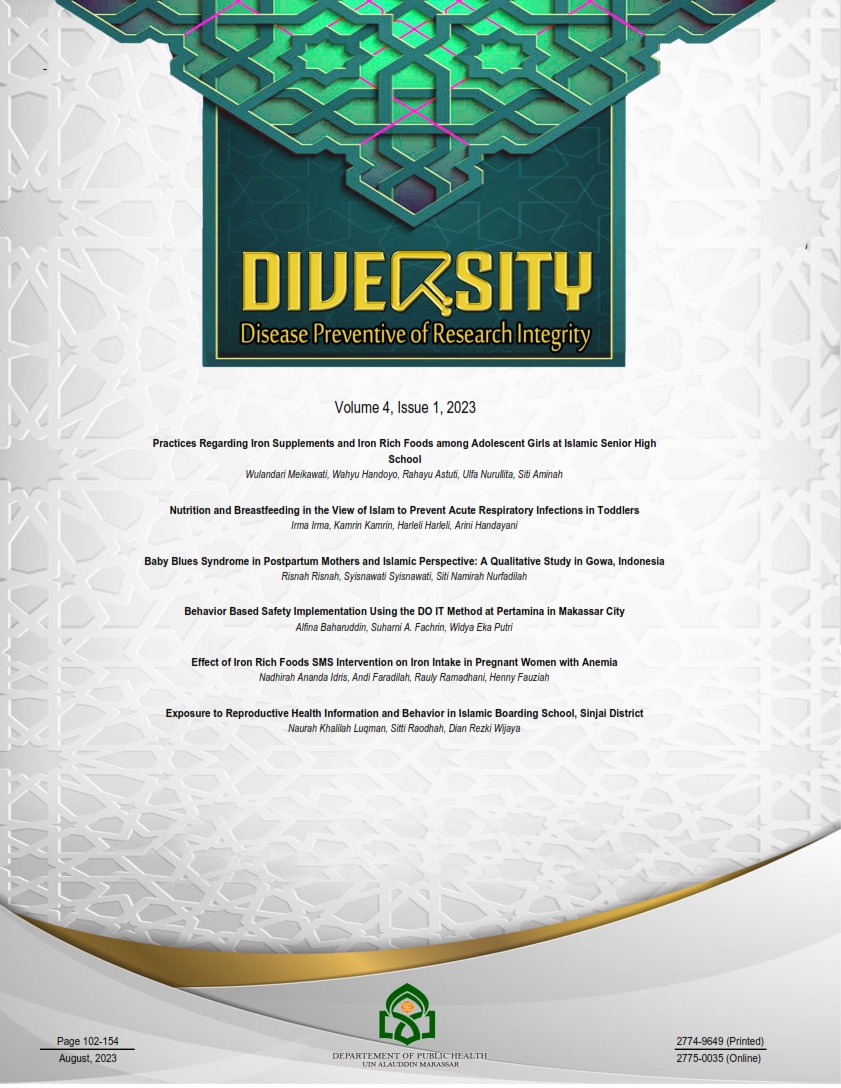Baby Blues Syndrome in Postpartum Mothers and Islamic Perspective: A Qualitative Study in Gowa, Indonesia
Abstract
Baby blues syndrome or mild depression tends to be experienced by mothers in the first week after giving birth and can have an effect on the physiological condition of the mother and the child's development. This study aims to describe in more depth the experience of baby blues syndrome in postpartum mothers in the work area of the Samata Health Center, Gowa Regency, so that they know what are the causal factors and what symptoms are experienced by postpartum mothers with baby blues syndrome. Using qualitative research methods with a phenomenological approach. The sampling technique uses purposive sampling techniques and data analysis techniques according to Colaizzi. There are three informants and the results of this study have been arranged into several themes, namely; feelings, behavior and thoughts of mothers who experience baby blues syndrome, causes of baby blues syndrome in postpartum mothers, and psychosocial needs and spirituality of postpartum mothers in the letting go phase. The conclusion from this study is that social support is one of the dominant factors that trigger postpartum mothers to experience baby blues syndrome. The results of this study prove the view of the Qur'an that women are creatures that are not strong enough physiologically so that it is necessary to pay attention during pregnancy because this period is considered to cause increased weakness.

Downloads
References
Adilla, D. R., Saputri, D., & Niriyah, S. (2019). Pengalaman postpartum blues pada ibu primipara. Jurnal Ners Indonesia, 9(2), 156-162. https://doi.org/10.31258/jni.9.2.156-162
Aryani, R., Afriana, A., & Faranita, F. (2022). Faktor-Faktor yang Berhubungan dengan Baby Blues Syndrome Pada Ibu Postpartum di RSUD dr. Zainoel Abidin Kota Banda Aceh. Journal of Healthcare Technology and Medicine, 8(2), 1325-1336. https://doi.org/10.33143/jhtm.v8i2.2401
Aryani, R., Afriana, A., & Faranita, F. (2022). Faktor-Faktor yang Berhubungan dengan Baby Blues Syndrome Pada Ibu Postpartum di RSUD dr. Zainoel Abidin Kota Banda Aceh. JOURNAL OF HEALTHCARE TECHNOLOGY AND MEDICINE, 8(2), 1325-1336. https://doi.org/10.33143/jhtm.v8i2.2401
Balqis, S., Mediastuti, F. M., & Widiastuti, R. (2022). Kejadian Depresi Postpartum pada Ibu yang Menikah Dini. Jurnal Ilmu Kebidanan (Journal of Midwivery Science), 10(2), 75-84. https://doi.org/10.36307/jik.v10i2.200
Fatmawati, A., & Gartika, N. (2021). The Hubungan Kondisi Psikososial Dan Paritas Dengan Kejadian Depresi Postpartum Pada Ibu Remaja. Faletehan Health Journal, 8(01), 36-41. https://doi.org/10.33746/fhj.v8i01.145
Fitri, I. (2022). Pengaruh Terapi Murottal Al-Qurán Dan Dzikir Terhadap Kejadian Postpartum Blues Di Wilayah Kerja Puskesmas Kotak Semarang (Doctoral dissertation, Universitas Islam Sultan Agung Semarang). http://repository.unissula.ac.id/25224/
Gilbert, L., Gross, J., Lanzi, S., Quansah, D. Y., Puder, J., & Horsch, A. (2019). How diet, physical activity and psychosocial well-being interact in women with gestational diabetes mellitus: an integrative review. BMC pregnancy and childbirth, 19, 1-16. https://doi.org/10.1186/s12884-019-2185-y
Glasser, S., Levinson, D., Gordon, E. S., Braun, T., Haklai, Z., & Goldberger, N. (2018). The tip of the iceberg: postpartum suicidality in Israel. Israel journal of health policy research, 7(1), 1-12.
Hapsari, S. D. (2022). Pertanggungjawaban Hukum Bagi Ibu Pengidap Baby Blues Syndrome Sebagai Pelaku TindakPidana Penganiayaan Terhadap Anak Kandungnya. Yustisia Tirtayasa: Jurnal Tugas Akhir, 2(1), 1-12. http://dx.doi.org/10.51825/yta.v2i1.14123
Hobeika, E., Malaeb, D., Obeid, S., Salameh, P., Hobeika, E., Outayek, M., & Hallit, S. (2023, January). Postpartum Depression and Anxiety among Lebanese Women: Correlates and Scales Psychometric Properties. In Healthcare (Vol. 11, No. 2, p. 201). MDPI. https://doi.org/10.3390/healthcare11020201
Indriani, I. (2022). Penanganan Baby Blues Syndrome Dalam Al-Qur’an. FiTUA: Jurnal Studi Islam, 3(1), 1-11. https://doi.org/10.47625/fitua.v3i1.340
Kemenkes RI. (2019). Profil Kesehatan Indonesia 2018. Kementrian Kesehatan Ri.
Klainin, P., & Arthur, D. G. (2009). Postpartum depression in Asian cultures: a literature review. International journal of nursing studies, 46(10), 1355-1373. https://doi.org/10.1016/j.ijnurstu.2009.02.012
Laitupa, S. A. K., Purwanti, E., & Hidayati, L. N. (2023). Pengalaman Baby blues Syndrome Pada Ibu Postpartum di Kabupaten Merauke. Journal of Pharmaceutical and Health Research, 4(1), 117-121. https://doi.org/10.47065/jharma.v4i1.2786
Meltzer-Brody, S., Howard, L. M., Bergink, V., Vigod, S., Jones, I., Munk-Olsen, T., Honikman, S., & Milgrom, J. (2018). Postpartum psychiatric disorders. Nature Reviews Disease Primers, 4(1), 1-18. https://doi.org/10.1038/nrdp.2018.22
Molgora, S., Fenaroli, V., Prino, L. E., Rollè, L., Sechi, C., Trovato, A., & Saita, E. (2018). Fear of childbirth in primiparous Italian pregnant women: The role of anxiety, depression, and couple adjustment. Women and Birth, 31(2), 117-123. https://doi.org/10.1016/j.wombi.2017.06.022
Mariany, M., Naim, R., & Afrianty, I. (2022). Hubungan Dukungan Sosial dengan Kejadian Postpartum Blues pada Ibu Nifas di Wilayah Kerja Puskesmas Pomalaa: The Relationship of Social Support with Postpartum Blues in Postpartum Mothers in the Work Area of Pomalaa Puskesmas. Jurnal Surya Medika (JSM), 8(2), 319-324. https://doi.org/10.33084/jsm.v8i2.3916
Namujju, J., Muhindo, R., Mselle, L. T., Waiswa, P., Nankumbi, J., & Muwanguzi, P. (2018). Childbirth experiences and their derived meaning: a qualitative study among postnatal mothers in Mbale regional referral hospital, Uganda. Reproductive health, 15, 1-11. https://doi.org/10.1186/s12978-018-0628-y
Nova, S., & Zagoto, S. (2020). Gambaran Pengetahuan Ibu Nifas tentang Adaptasi Psikologis pada Masa Nifas di Klinik Pratama Afiyah Pekanbaru Tahun 2019. Al-Insyirah Midwifery: Jurnal Ilmu Kebidanan (Journal of Midwifery Sciences), 9(2), 108-113. https://doi.org/10.35328/kebidanan.v9i2.674
Qi, W., Liu, Y., Lv, H., Ge, J., Meng, Y., Zhao, N., & Hu, J. (2022). Effects of family relationship and social support on the mental health of Chinese postpartum women. BMC pregnancy and childbirth, 22(1), 65. https://doi.org/10.1186/s12884-022-04392-w
Rahma, M., Anggraini, R., & Yuningsih, Y. (2023). Gambaran Tingkat Pengetahuan Ibu Postparum Tentang Baby Blues di BPM Lismarini. Al-Insyirah Midwifery: Jurnal Ilmu Kebidanan (Journal of Midwifery Sciences), 12(1), 56-65. https://doi.org/10.35328/kebidanan.v12i1.2335
Rosa, E. M., Apriyanti, P., & Astuti, D. A. (2021). Husband’s Support in the Taking-hold Phase of Postpartum (Phenomenology Study). Open Access Macedonian Journal of Medical Sciences, 9(T4). https://doi.org/10.3889/oamjms.2021.5761
Sari, D. S., & Widyaningrum, N. R. (2018). Pengaruh Aromaterapi Minyak Sereh (Cymbopogon citratus) Terhadap Pencegahan Postpartum Blues Pada Ibu Primipara Di RSUD Kabupaten Sukoharjo The Effect Of Aromatherapy Oils Of Lemongrass (Cymbopogon citratus) On Prevention Of Postpartum Blues In Primipara. Indonesian Journal On Medical Science, 5(1).
Sipasulta, N. G. C., Imamah, I. N., & Tanihatu, G. E. (2023). Experiences and Expectations of Post-Partum Mothers Toward Psychosocial Nursing Services for Mothers Who Have Experienced Postpartum Blues in City of Balikpapan. Pharmacognosy Journal, 15(3). http://dx.doi.org/10.5530/pj.2023.15.104
Sofiana, E. (2022). Literature Review Adaptasi Psikologis Pada Ibu Postpartum (Doctoral dissertation, STIKES Insan Cendekia Jombang). http://repo.stikesicme-jbg.ac.id/6448/
Suarez, A., & Yakupova, V. (2023). Past traumatic life events, postpartum PTSD, and the role of labor support. International journal of environmental research and public health, 20(11), 6048. https://doi.org/10.3390/ijerph20116048
Taviyanda, D. (2019). Adaptasi Psikologis Pada Ibu Postpartum Primigravida (Fase Taking Hold) Sectio Caesarea Dan Partus Normal. Jurnal Penelitian Keperawatan, 5(1). https://doi.org/10.32660/jurnal.v5i1.339
WHO. (2018). Postpartum Care Of The Mother And Newborn : A Practicalguide. World Health Organization.
Wiandri, N. S. (2022). Penggunaan Sudut Pandang Tokoh Utama Untuk Merepresentasikan Teori 5 Stages Of Grief Kubler Ross Dalam Penulisan Skenario Film”Senandika Lara” (Doctoral dissertation, Institut Seni Indonesia Yogyakarta). http://digilib.isi.ac.id/10563/
Widyaningtyas, M. D. (2019). Pengalaman Komunikasi Ibu Dengan Baby Blues Syndrome Dalam Paradigma Naratif. Jurnal Manajemen Komunikasi, 3(2), 202. https://doi.org/10.24198/jmk.v3i2.20504
Wijaya, Y. A., Yudhawati, N. L. P. S., Andriana, K. R. F., & Ilmy, S. K. (2022, March 27). Classification Of Nursing Theory Developed By Nursing Experts: A Literature Review.
Wyska, E. (2019). Pharmacokinetic considerations for current state-of-the-art antidepressants. Expert opinion on drug metabolism & toxicology, 15(10), 831-847. https://doi.org/10.1080/17425255.2019.1669560
Yang, W. J., Bai, Y. M., Qin, L., Xu, X. L., Bao, K. F., Xiao, J. L., & Ding, G. W. (2019). The effectiveness of music therapy for postpartum depression: A systematic review and meta-analysis. Complementary therapies in clinical practice, 37, 93-101. https://doi.org/10.1016/j.ctcp.2019.09.002
Yolanda, D. (2019). Faktor Determinan yang Mempengaruhi Kejadian Postpartum Blues pada Ibu Nifas di Wilayah Kerja Puskesmas Ibuh Kota Payakumbuh. DINAMIKA KESEHATAN: JURNAL KEBIDANAN DAN KEPERAWATAN, 10(2), 537-545. https://doi.org/10.33859/dksm.v10i2.521
Yuliarna, Y., Sari, N., Karmila, K., Ginting, S., Sartika, E., & Khadijah, N. (2023). Hubungan Komplikasi Kehamilan dan Persalinan Dengan Baby Blues Syndrom Pada Ibu Pasca Persalinan di Klinik Elly Kec. Medan Helvetia tahun 2022. Jurnal Ilmiah Kedokteran dan Kesehatan, 2(1), 171-182. https://doi.org/10.55606/klinik.v2i1.1228
Copyright (c) 2023 Risnah Risnah, Syisnawati Syisnawati, Siti Namirah Nurfadilah

This work is licensed under a Creative Commons Attribution-NonCommercial-ShareAlike 4.0 International License.
Authors retain copyright and grant the journal right of first publication with the work simultaneously licensed under a Creative Commons Attribution-NonCommercial-ShareAlike 4.0 International License that allows others to share the work with an acknowledgment of the work's authorship and initial publication in this journal.
Authors are able to enter into separate, additional contractual arrangements for the non-exclusive distribution of the journal's published version of the work (e.g., post it to an institutional repository or publish it in a book), with an acknowledgment of its initial publication in this journal.
Authors are permitted to publish their work online in third parties as it can lead to wider dissemination of the work.




